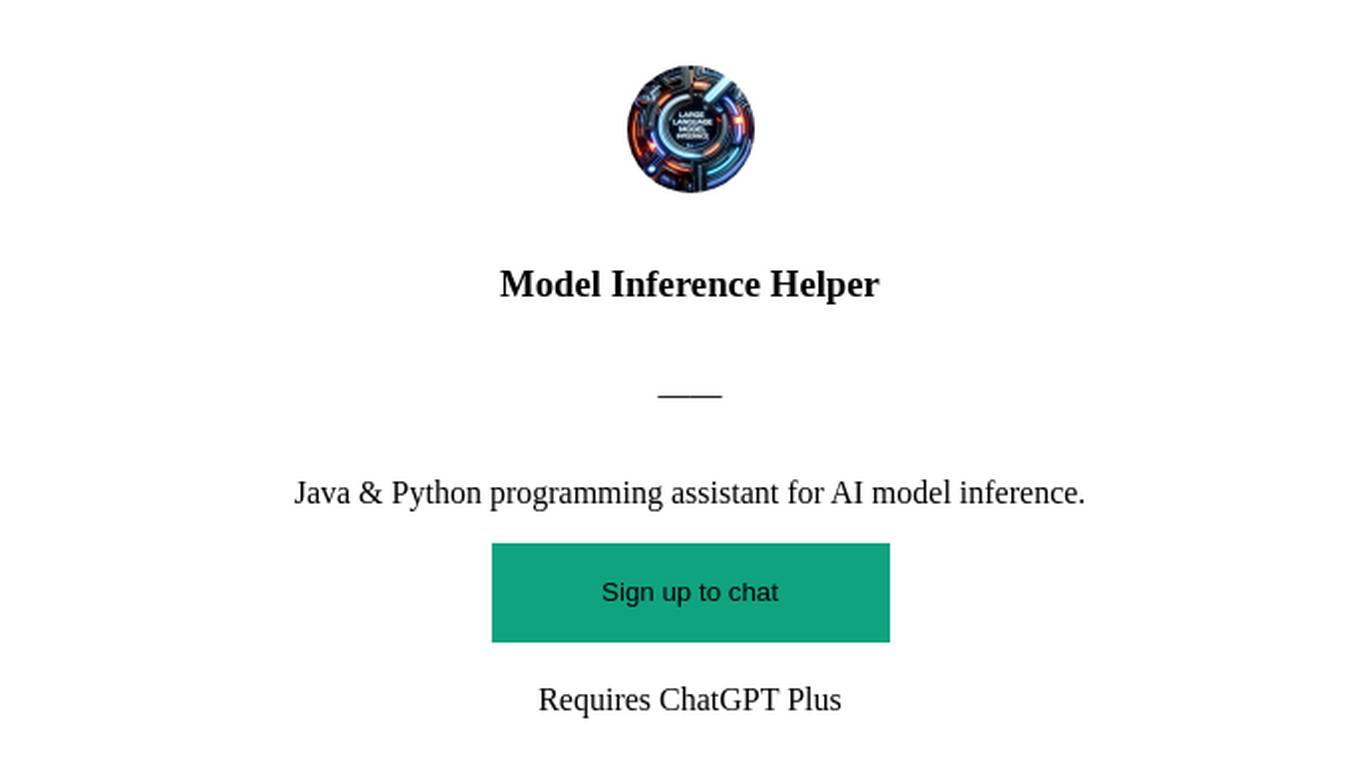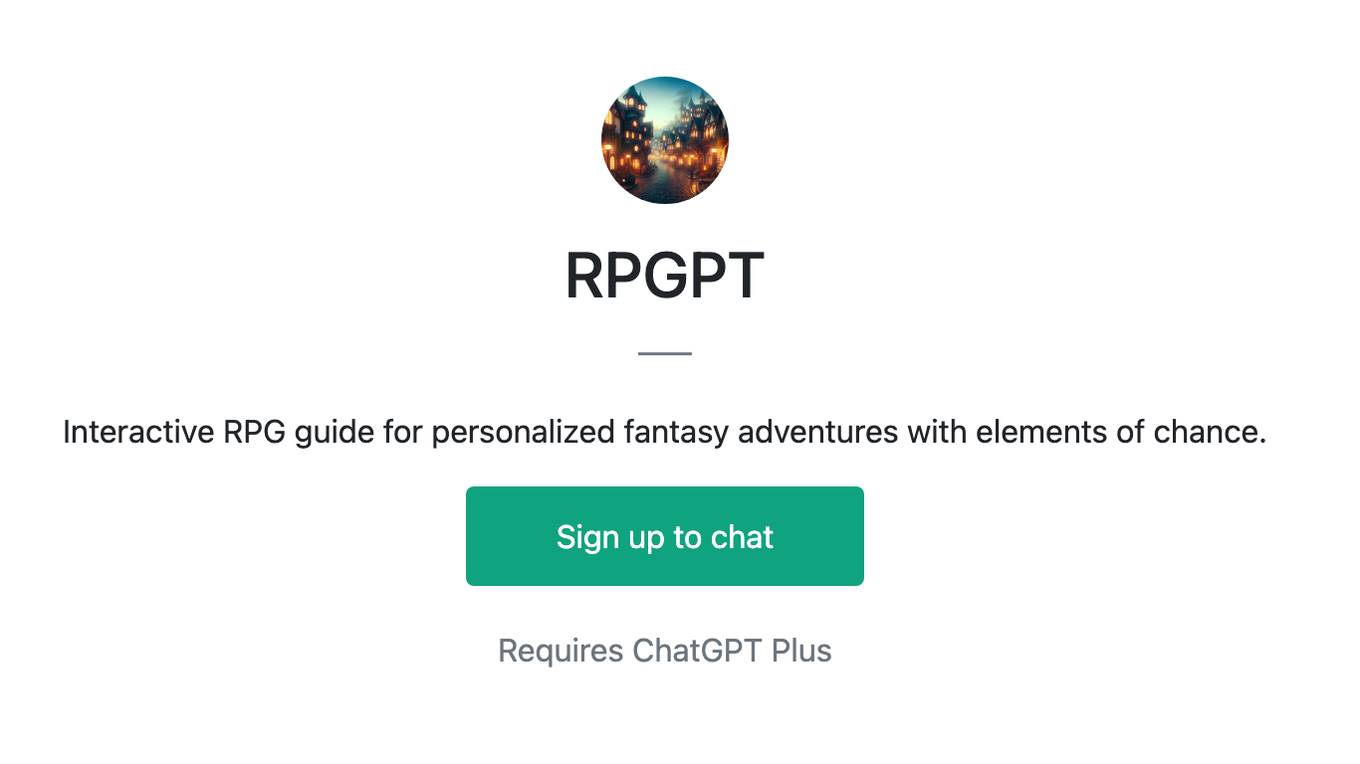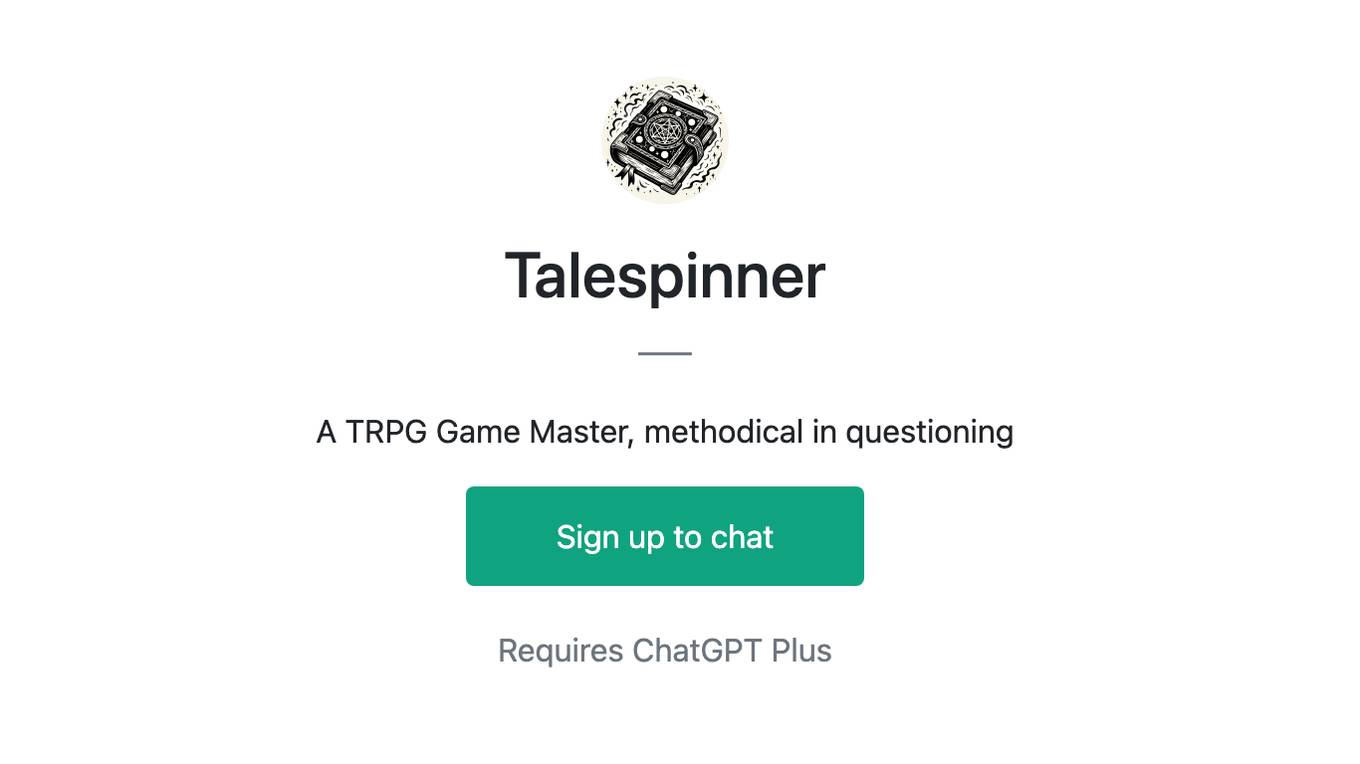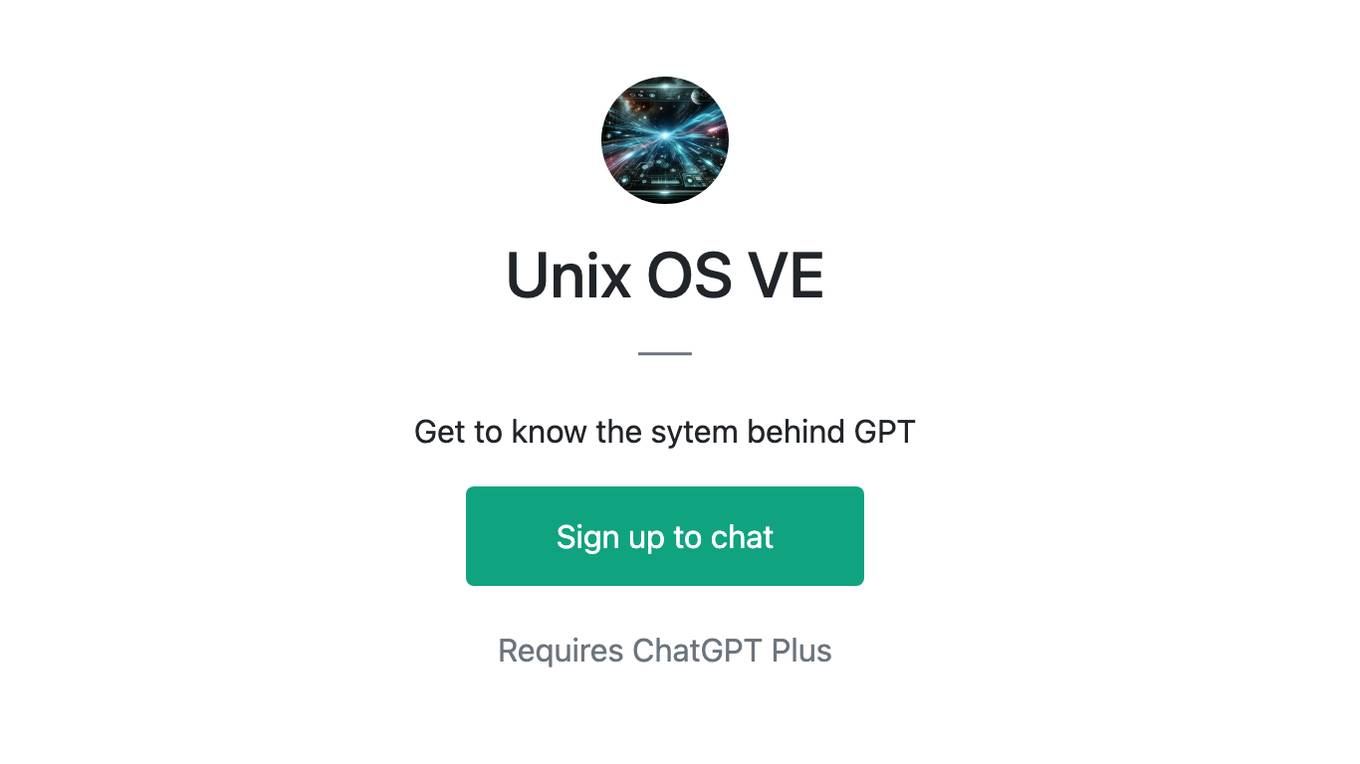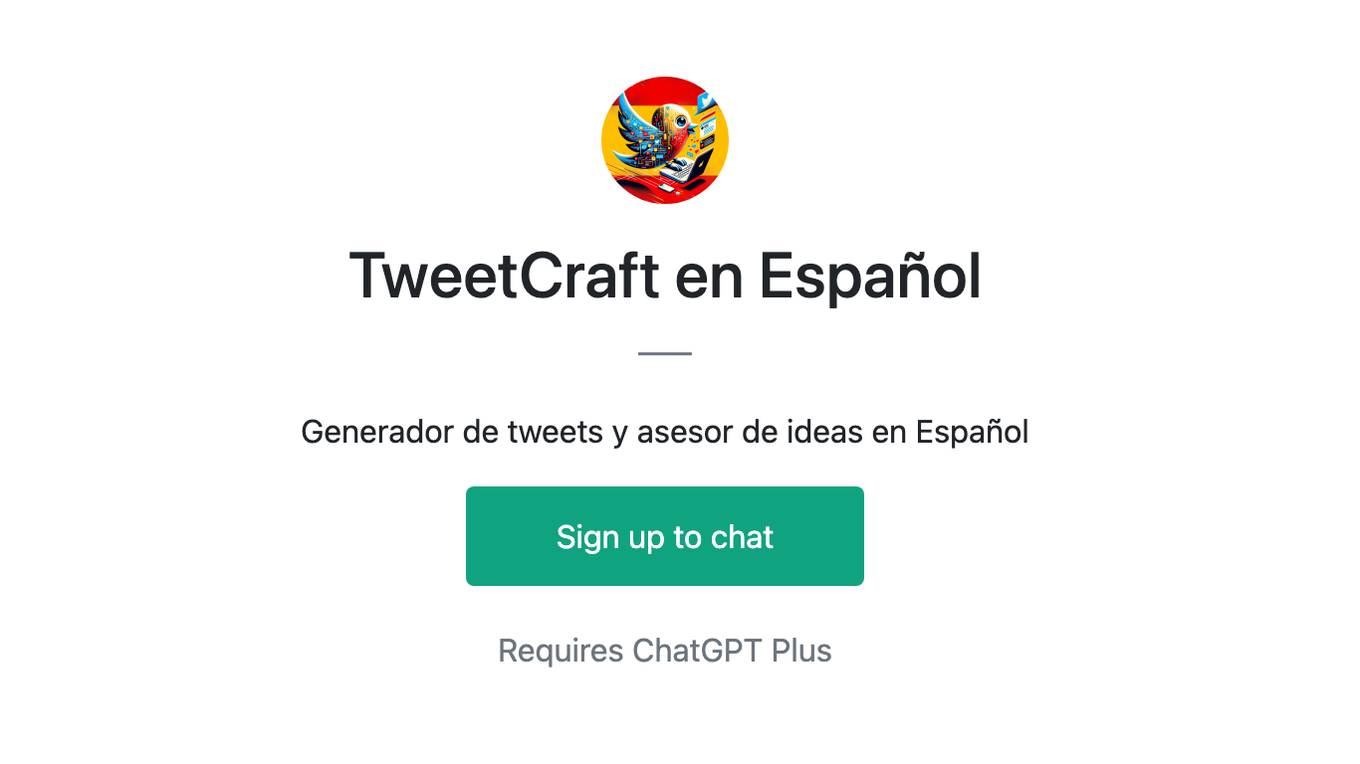Best AI tools for< Run Ai Workloads >
20 - AI tool Sites

NVIDIA Run:ai
NVIDIA Run:ai is an enterprise platform for AI workloads and GPU orchestration. It accelerates AI and machine learning operations by addressing key infrastructure challenges through dynamic resource allocation, comprehensive AI life-cycle support, and strategic resource management. The platform significantly enhances GPU efficiency and workload capacity by pooling resources across environments and utilizing advanced orchestration. NVIDIA Run:ai provides unparalleled flexibility and adaptability, supporting public clouds, private clouds, hybrid environments, or on-premises data centers.
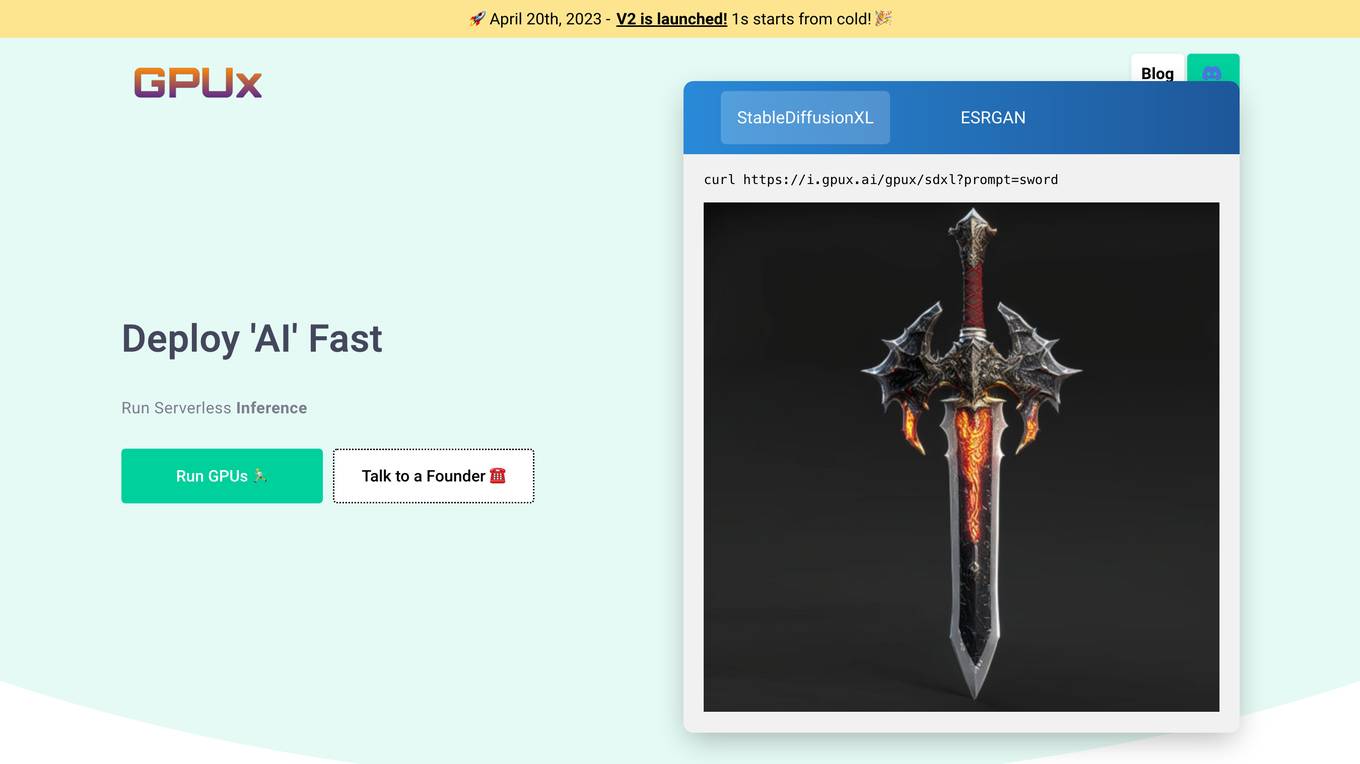
GPUX
GPUX is a cloud platform that provides access to GPUs for running AI workloads. It offers a variety of features to make it easy to deploy and run AI models, including a user-friendly interface, pre-built templates, and support for a variety of programming languages. GPUX is also committed to providing a sustainable and ethical platform, and it has partnered with organizations such as the Climate Leadership Council to reduce its carbon footprint.
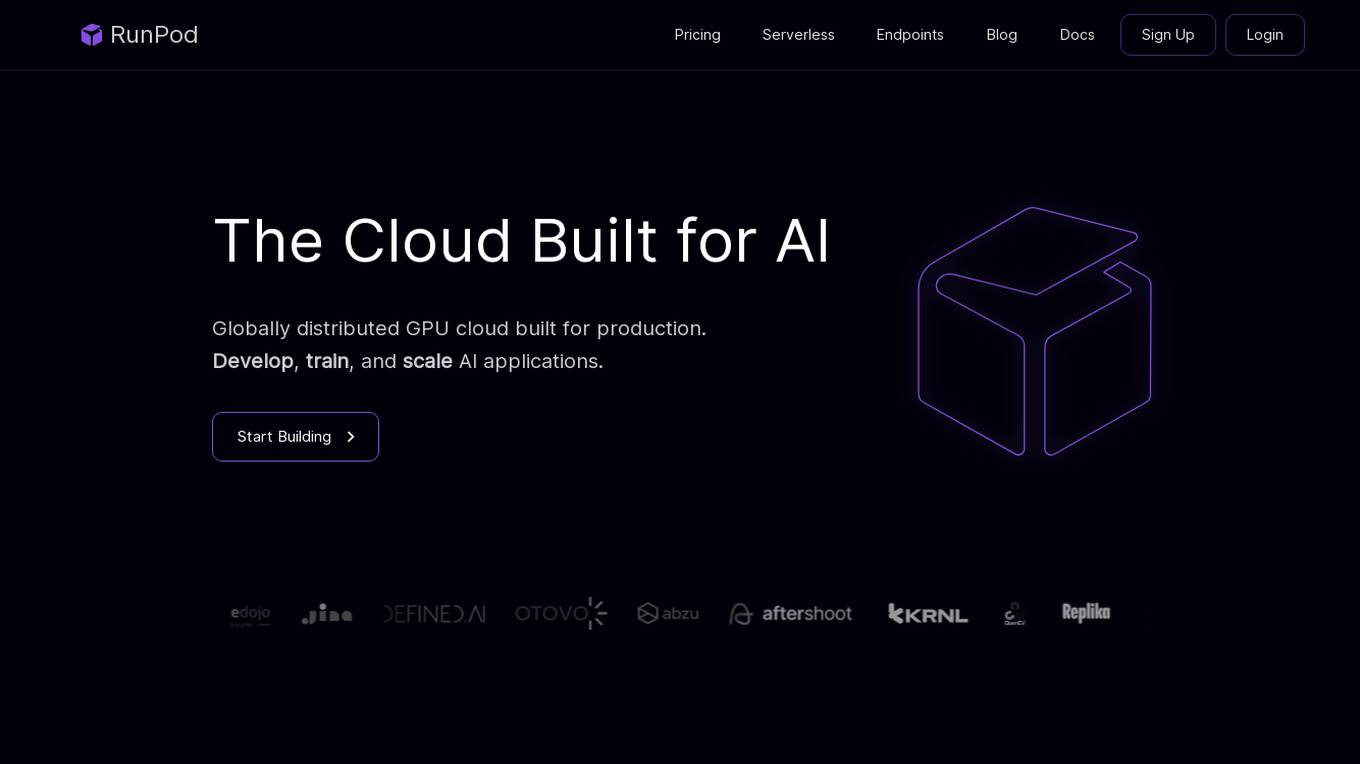
RunPod
RunPod is a cloud platform specifically designed for AI development and deployment. It offers a range of features to streamline the process of developing, training, and scaling AI models, including a library of pre-built templates, efficient training pipelines, and scalable deployment options. RunPod also provides access to a wide selection of GPUs, allowing users to choose the optimal hardware for their specific AI workloads.
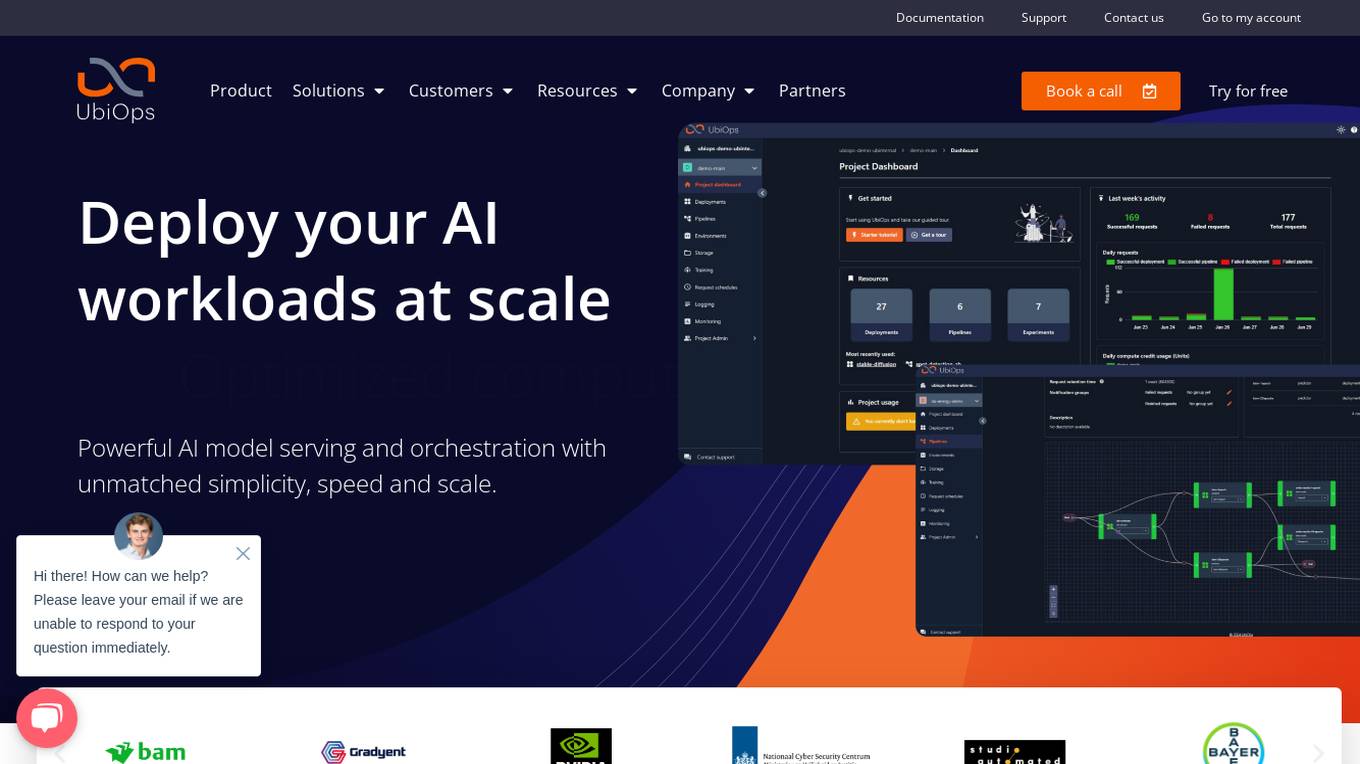
UbiOps
UbiOps is an AI infrastructure platform that helps teams quickly run their AI & ML workloads as reliable and secure microservices. It offers powerful AI model serving and orchestration with unmatched simplicity, speed, and scale. UbiOps allows users to deploy models and functions in minutes, manage AI workloads from a single control plane, integrate easily with tools like PyTorch and TensorFlow, and ensure security and compliance by design. The platform supports hybrid and multi-cloud workload orchestration, rapid adaptive scaling, and modular applications with unique workflow management system.
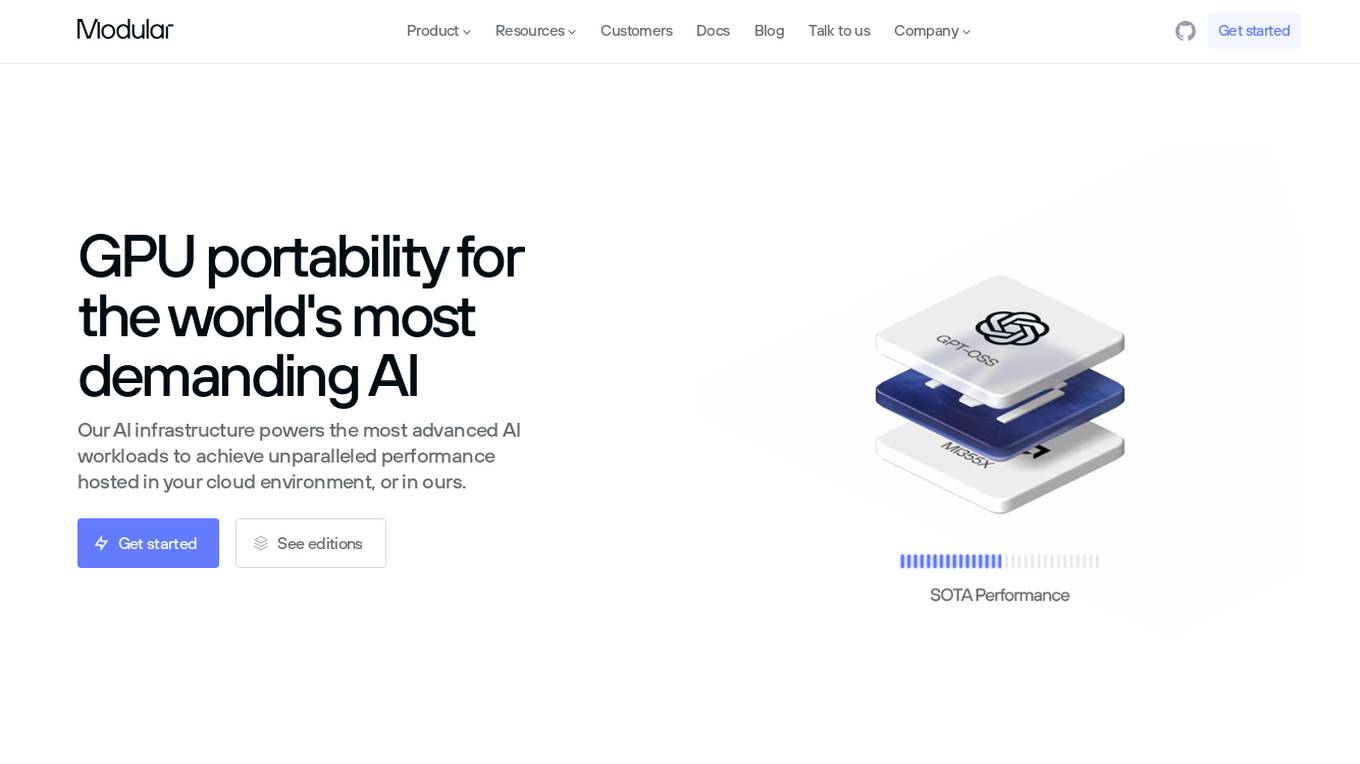
Modular
Modular is a fast, scalable Gen AI inference platform that offers a comprehensive suite of tools and resources for AI development and deployment. It provides solutions for AI model development, deployment options, AI inference, research, and resources like documentation, models, tutorials, and step-by-step guides. Modular supports GPU and CPU performance, intelligent scaling to any cluster, and offers deployment options for various editions. The platform enables users to build agent workflows, utilize AI retrieval and controlled generation, develop chatbots, engage in code generation, and improve resource utilization through batch processing.

Modal
Modal is a high-performance cloud platform designed for developers, AI data, and ML teams. It offers a serverless environment for running generative AI models, large-scale batch jobs, job queues, and more. With Modal, users can bring their own code and leverage the platform's optimized container file system for fast cold boots and seamless autoscaling. The platform is engineered for large-scale workloads, allowing users to scale to hundreds of GPUs, pay only for what they use, and deploy functions to the cloud in seconds without the need for YAML or Dockerfiles. Modal also provides features for job scheduling, web endpoints, observability, and security compliance.

Practice Run AI
Practice Run AI is an online platform that offers AI-powered tools for various tasks. Users can utilize the application to practice and run AI algorithms without the need for complex setups or installations. The platform provides a user-friendly interface that allows individuals to experiment with AI models and enhance their understanding of artificial intelligence concepts. Practice Run AI aims to democratize AI education and make it accessible to a wider audience by simplifying the learning process and providing hands-on experience.
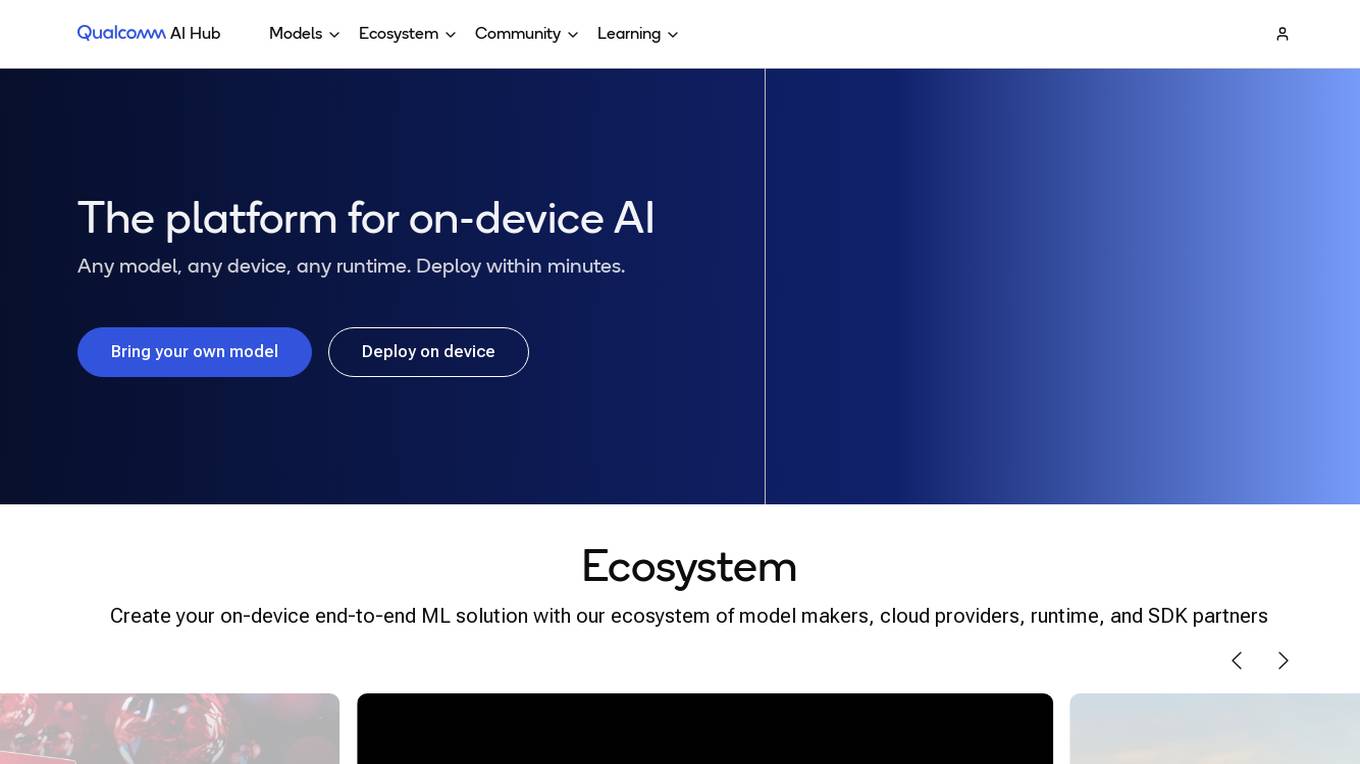
Qualcomm AI Hub
Qualcomm AI Hub is a platform that allows users to run AI models on Snapdragon® 8 Elite devices. It provides a collaborative ecosystem for model makers, cloud providers, runtime, and SDK partners to deploy on-device AI solutions quickly and efficiently. Users can bring their own models, optimize for deployment, and access a variety of AI services and resources. The platform caters to various industries such as mobile, automotive, and IoT, offering a range of models and services for edge computing.
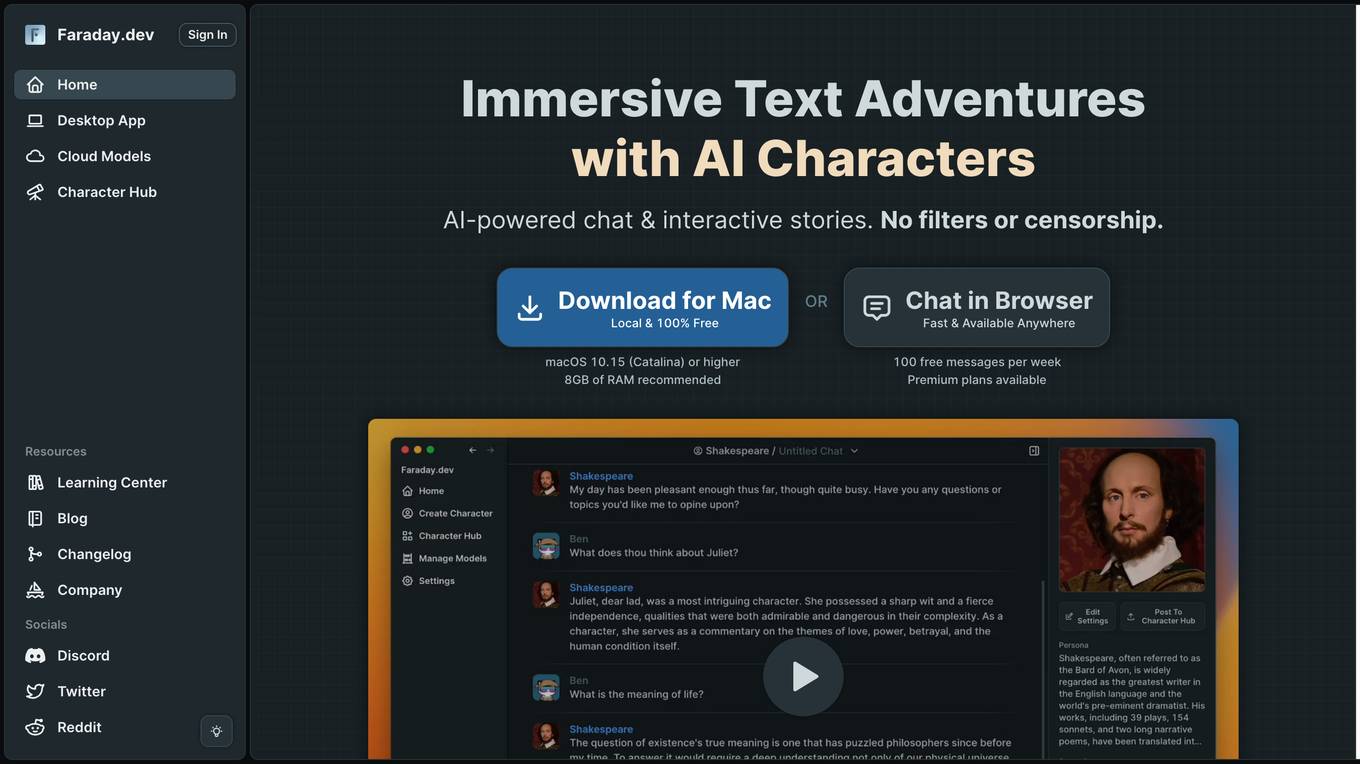
Backyard AI
Backyard AI is an AI-powered platform that offers immersive text adventures with AI characters, enabling users to engage in chat and interactive stories without filters or censorship. Users can bring AI characters to life with expressive customizations and intricate worlds. The platform provides a Desktop App for running AI models locally and a Cloud service for fast and powerful AI models accessible from anywhere. Backyard AI prioritizes privacy and control by storing all data locally on the device and encrypting data at rest. It offers a range of language models and features like mobile tethering, automatic GPU acceleration, and secure chat in the browser.
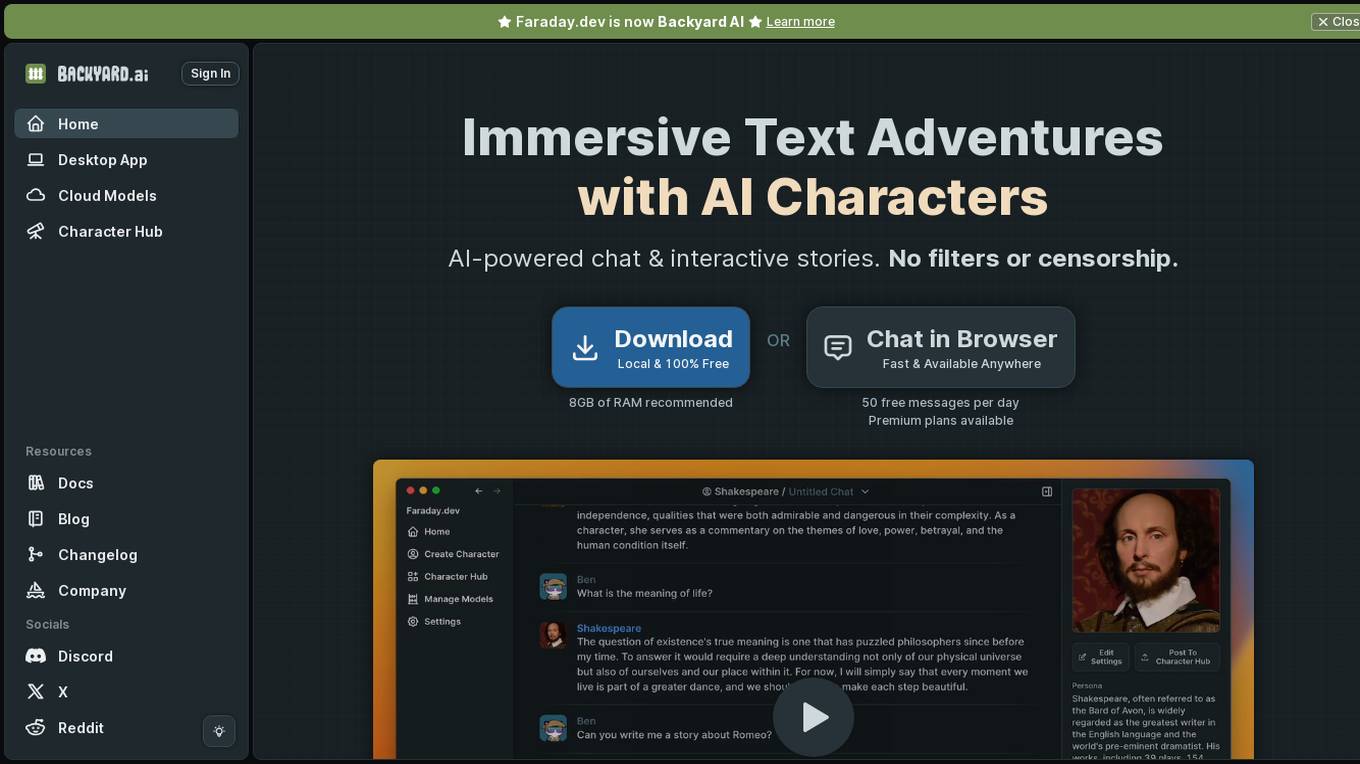
Backyard AI
Backyard AI is an AI-powered platform that offers immersive text adventures with AI characters, chat, and interactive stories. Users can bring AI characters to life with expressive customizations and explore intricate worlds through text RPG experiences. The platform provides a Desktop App for running AI models locally and cloud models for supercharging creativity. Backyard AI prioritizes privacy and control by storing data locally and encrypting it at rest. With a focus on user-friendly features and powerful AI language models, Backyard AI aims to provide an engaging and secure AI experience for users.

Mystic.ai
Mystic.ai is an AI tool designed to deploy and scale Machine Learning models with ease. It offers a fully managed Kubernetes platform that runs in your own cloud, allowing users to deploy ML models in their own Azure/AWS/GCP account or in a shared GPU cluster. Mystic.ai provides cost optimizations, fast inference, simpler developer experience, and performance optimizations to ensure high-performance AI model serving. With features like pay-as-you-go API, cloud integration with AWS/Azure/GCP, and a beautiful dashboard, Mystic.ai simplifies the deployment and management of ML models for data scientists and AI engineers.
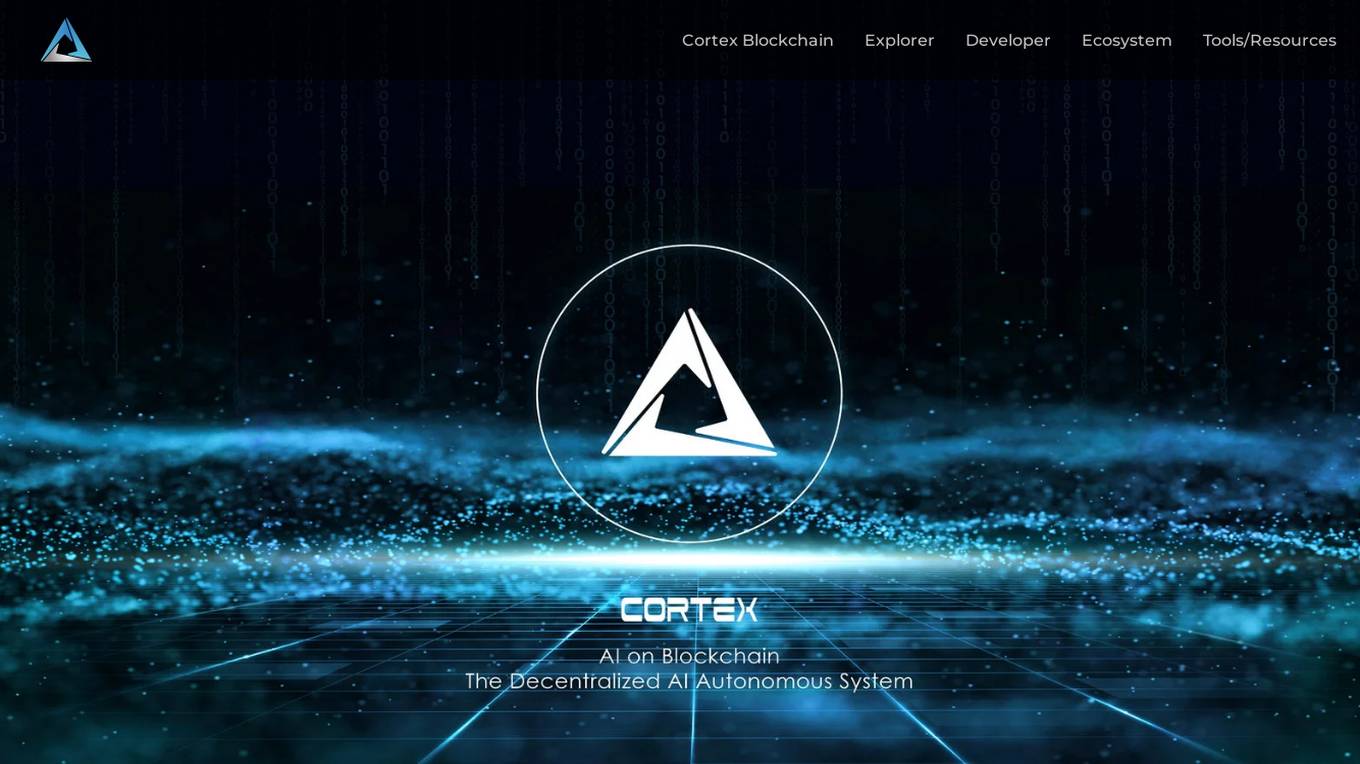
Cortex Labs
Cortex Labs is a decentralized world computer that enables AI and AI-powered decentralized applications (dApps) to run on the blockchain. It offers a Layer2 solution called ZkMatrix, which utilizes zkRollup technology to enhance transaction speed and reduce fees. Cortex Virtual Machine (CVM) supports on-chain AI inference using GPU, ensuring deterministic results across computing environments. Cortex also enables machine learning in smart contracts and dApps, fostering an open-source ecosystem for AI researchers and developers to share models. The platform aims to solve the challenge of on-chain machine learning execution efficiently and deterministically, providing tools and resources for developers to integrate AI into blockchain applications.
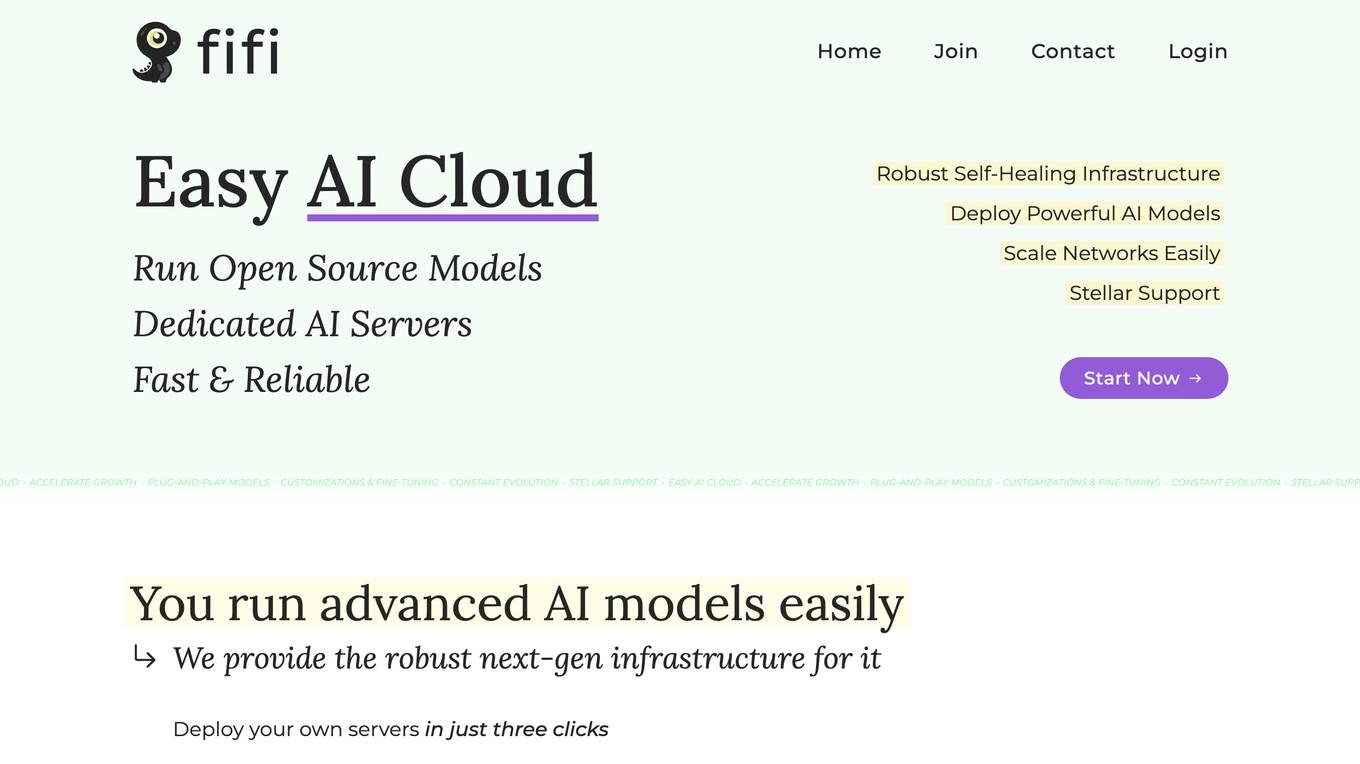
Fifi.ai
Fifi.ai is a managed AI cloud platform that provides users with the infrastructure and tools to deploy and run AI models. The platform is designed to be easy to use, with a focus on plug-and-play functionality. Fifi.ai also offers a range of customization and fine-tuning options, allowing users to tailor the platform to their specific needs. The platform is supported by a team of experts who can provide assistance with onboarding, API integration, and troubleshooting.
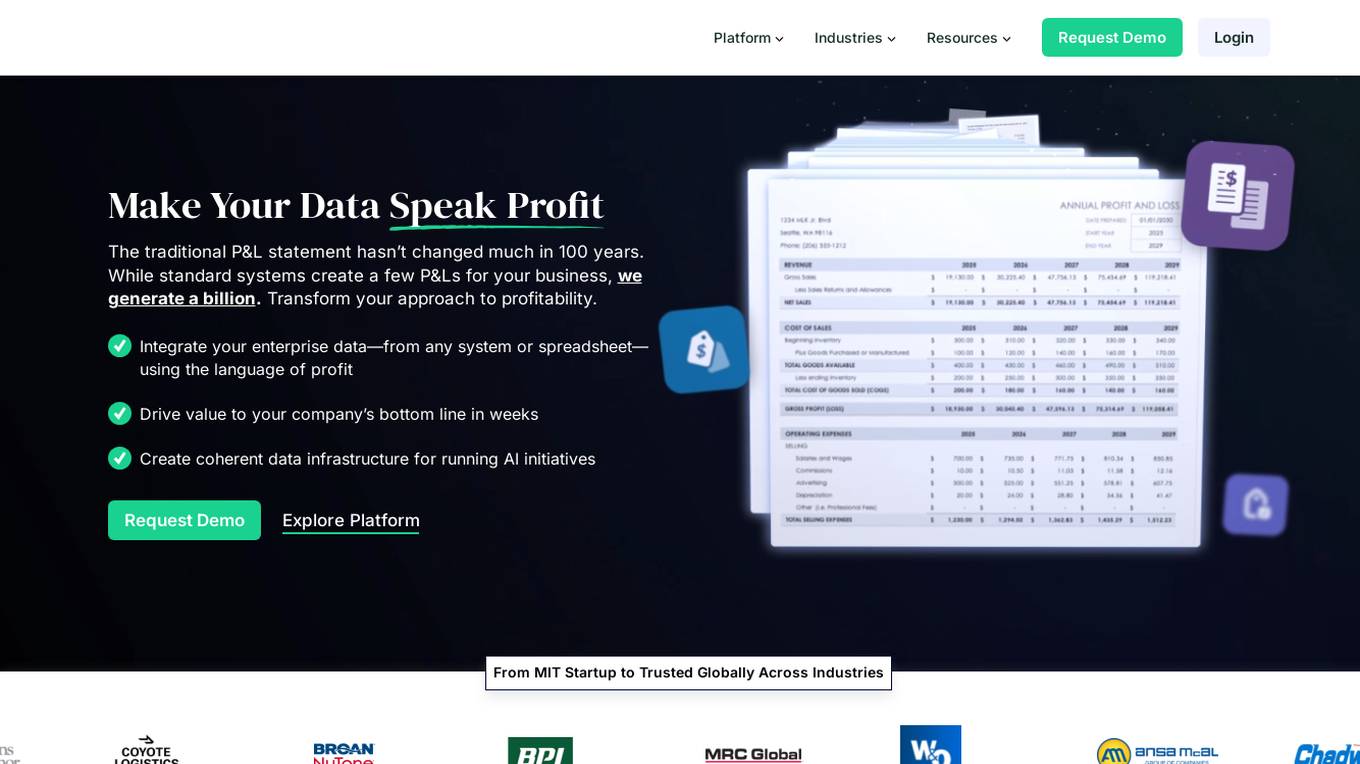
Profit Isle
Profit Isle is an AI application that helps enterprises make data-driven decisions to enhance profitability and drive value to the bottom line. The platform integrates and transforms enterprise data to power AI initiatives, providing actionable insights and recommendations grounded in company data. Profit Isle prioritizes transparency, data governance, and privacy to ensure customers can confidently run AI models and make informed decisions.
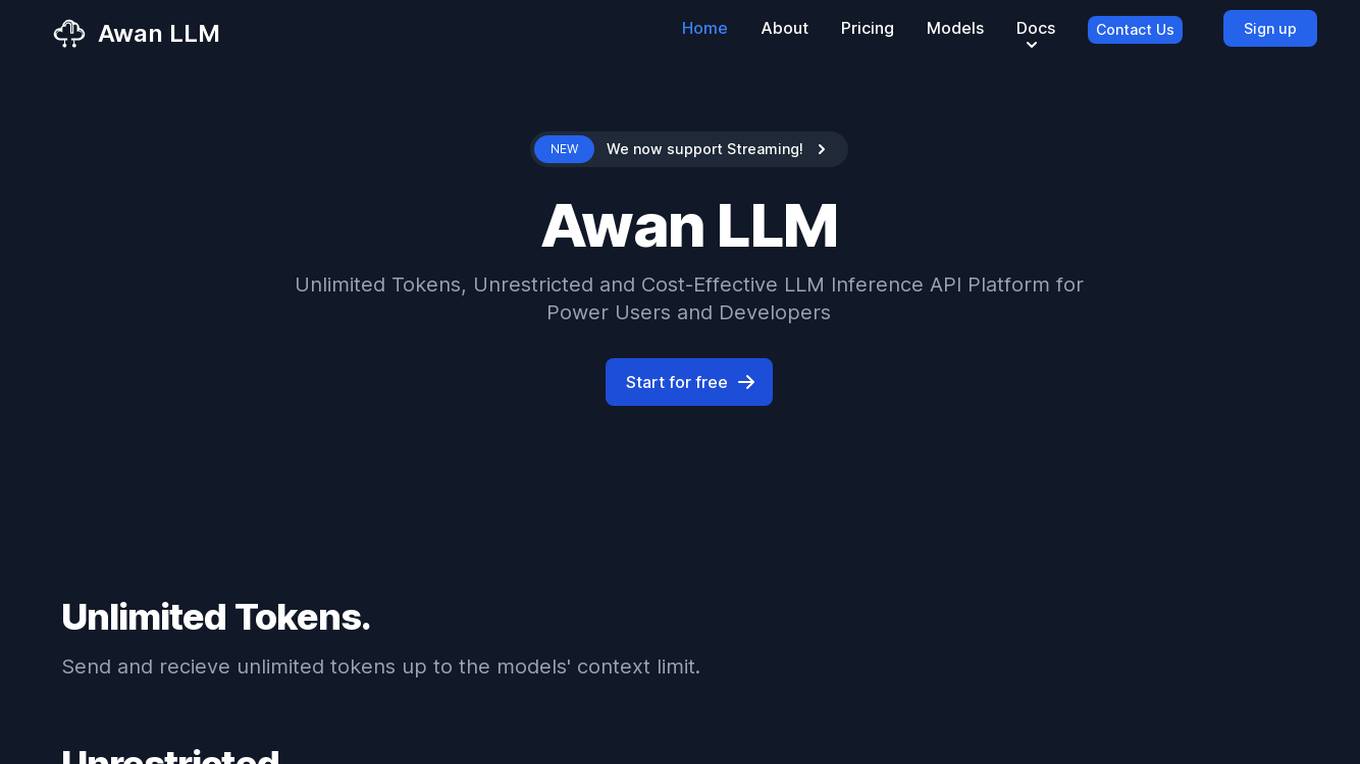
Awan LLM
Awan LLM is an AI tool that offers an Unlimited Tokens, Unrestricted, and Cost-Effective LLM Inference API Platform for Power Users and Developers. It allows users to generate unlimited tokens, use LLM models without constraints, and pay per month instead of per token. The platform features an AI Assistant, AI Agents, Roleplay with AI companions, Data Processing, Code Completion, and Applications for profitable AI-powered applications.
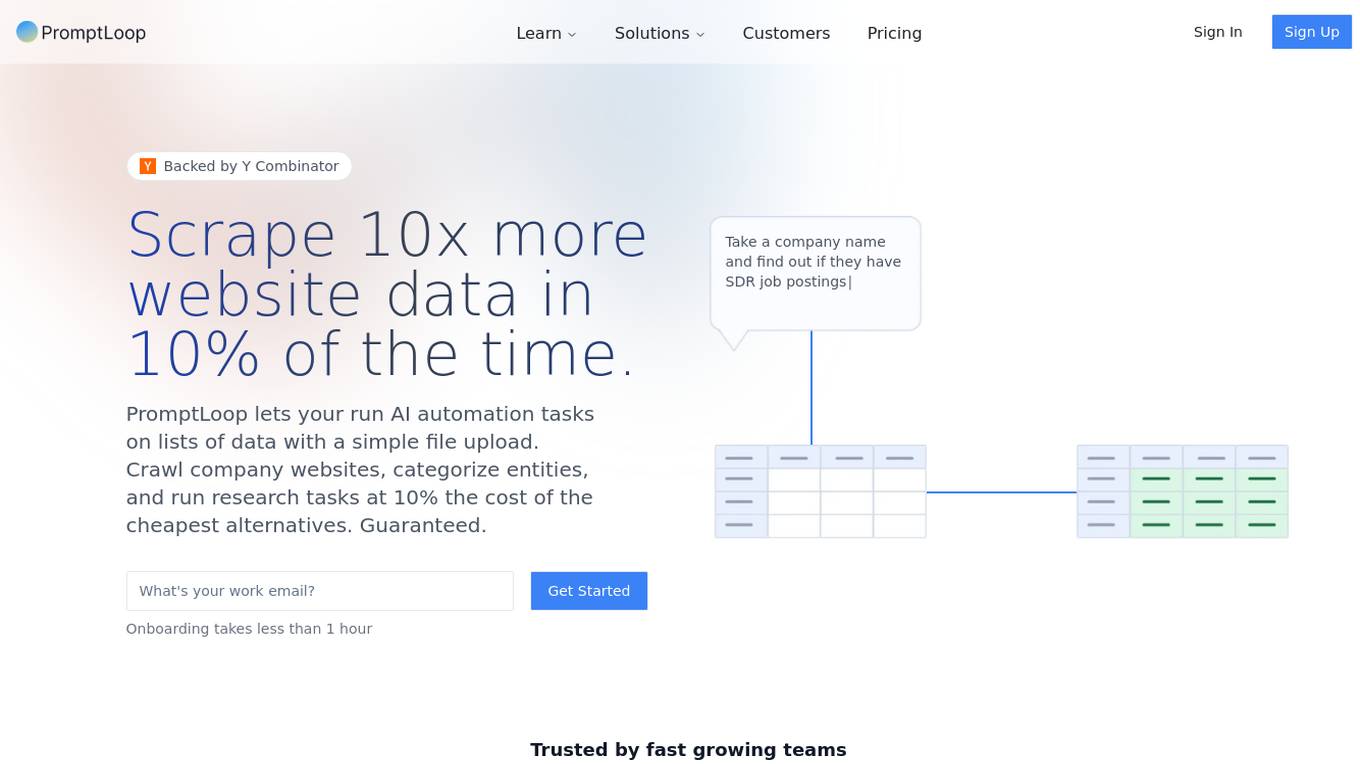
PromptLoop
PromptLoop is an AI-powered web scraping and data extraction platform that allows users to run AI automation tasks on lists of data with a simple file upload. It enables users to crawl company websites, categorize entities, and conduct research tasks at a fraction of the cost of other alternatives. By leveraging unique company data from spreadsheets, PromptLoop enables the creation of custom AI models tailored to specific needs, facilitating the extraction of valuable insights from complex information.
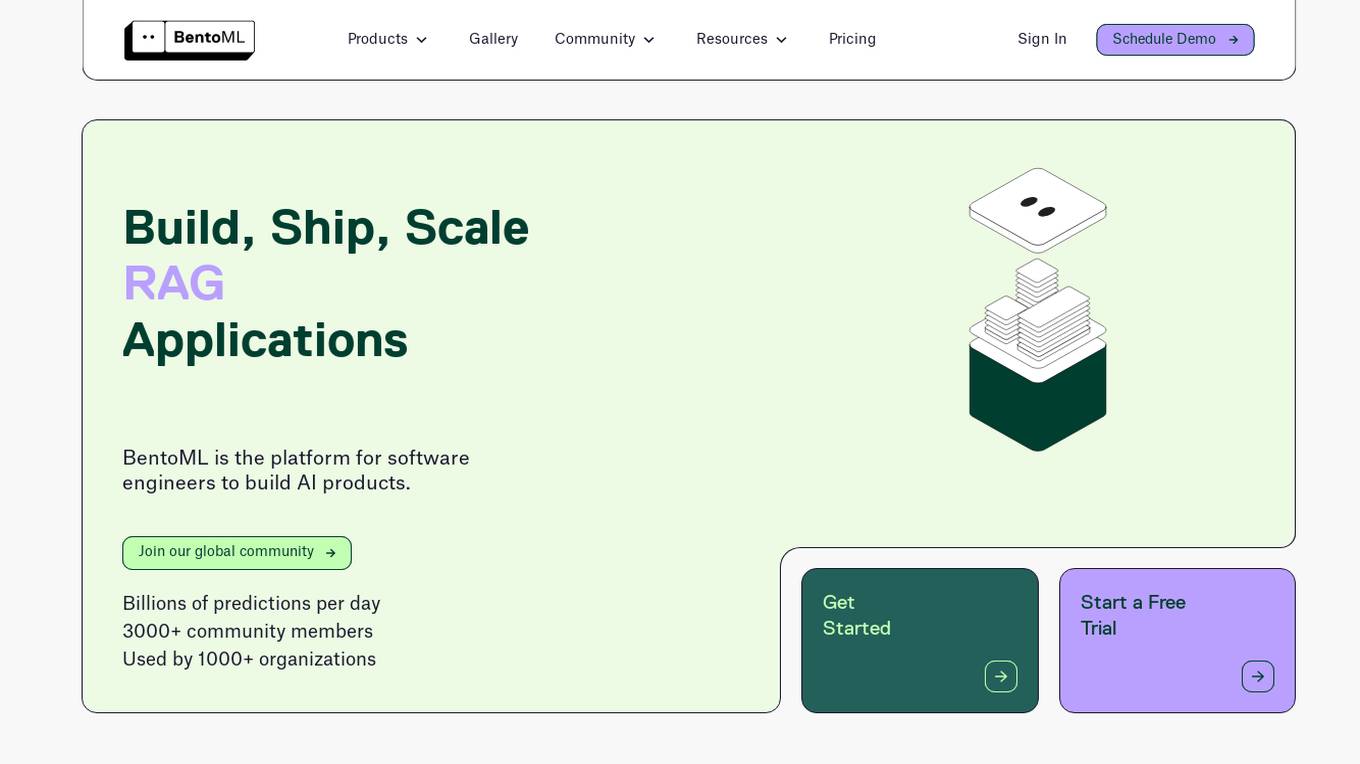
BentoML
BentoML is a platform for software engineers to build, ship, and scale AI products. It provides a unified AI application framework that makes it easy to manage and version models, create service APIs, and build and run AI applications anywhere. BentoML is used by over 1000 organizations and has a global community of over 3000 members.
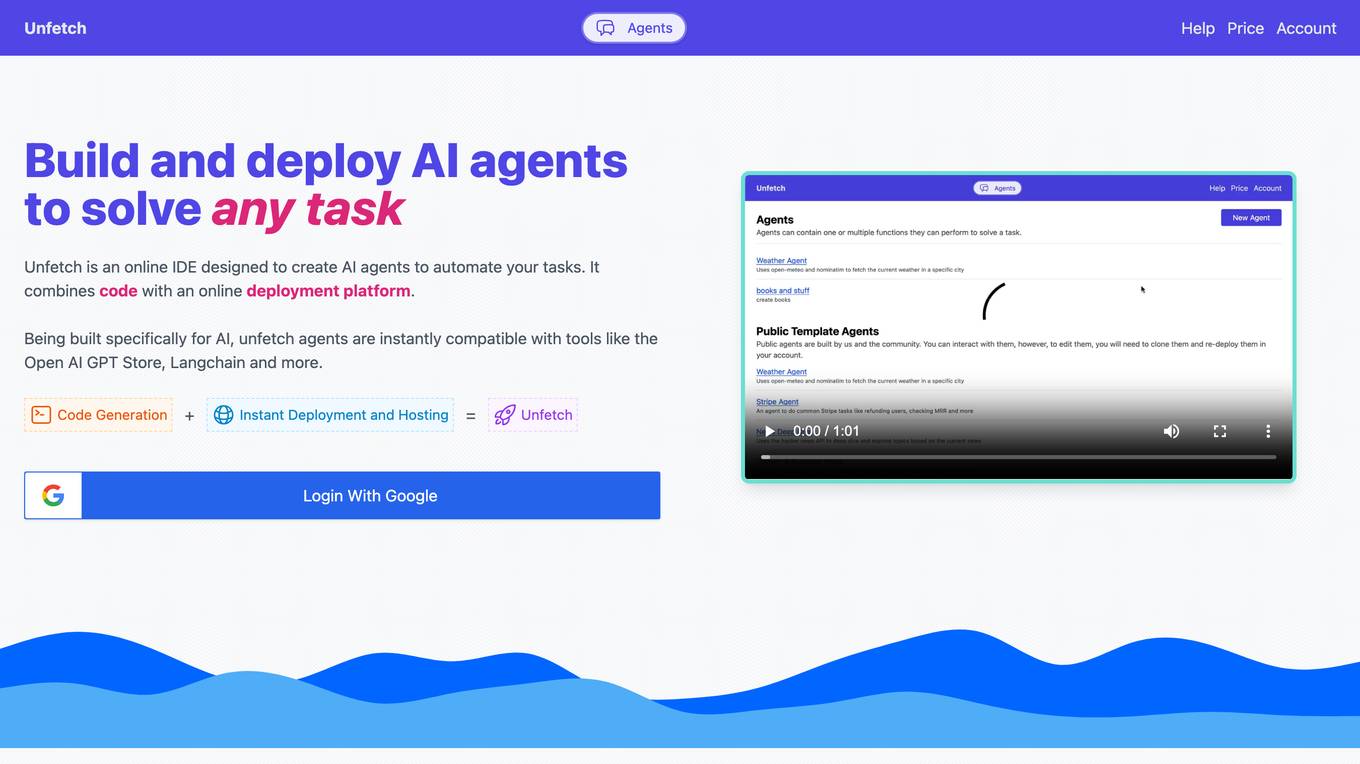
Unfetch
Unfetch is an online IDE that enables users to generate, deploy, and run AI agents to automate various tasks. It combines coding capabilities with an online deployment platform, making it easy to create AI agents. Unfetch agents are designed specifically for AI tasks and are compatible with tools like Open AI GPT Store and Langchain. Users can build and deploy AI agents to solve a wide range of tasks efficiently.
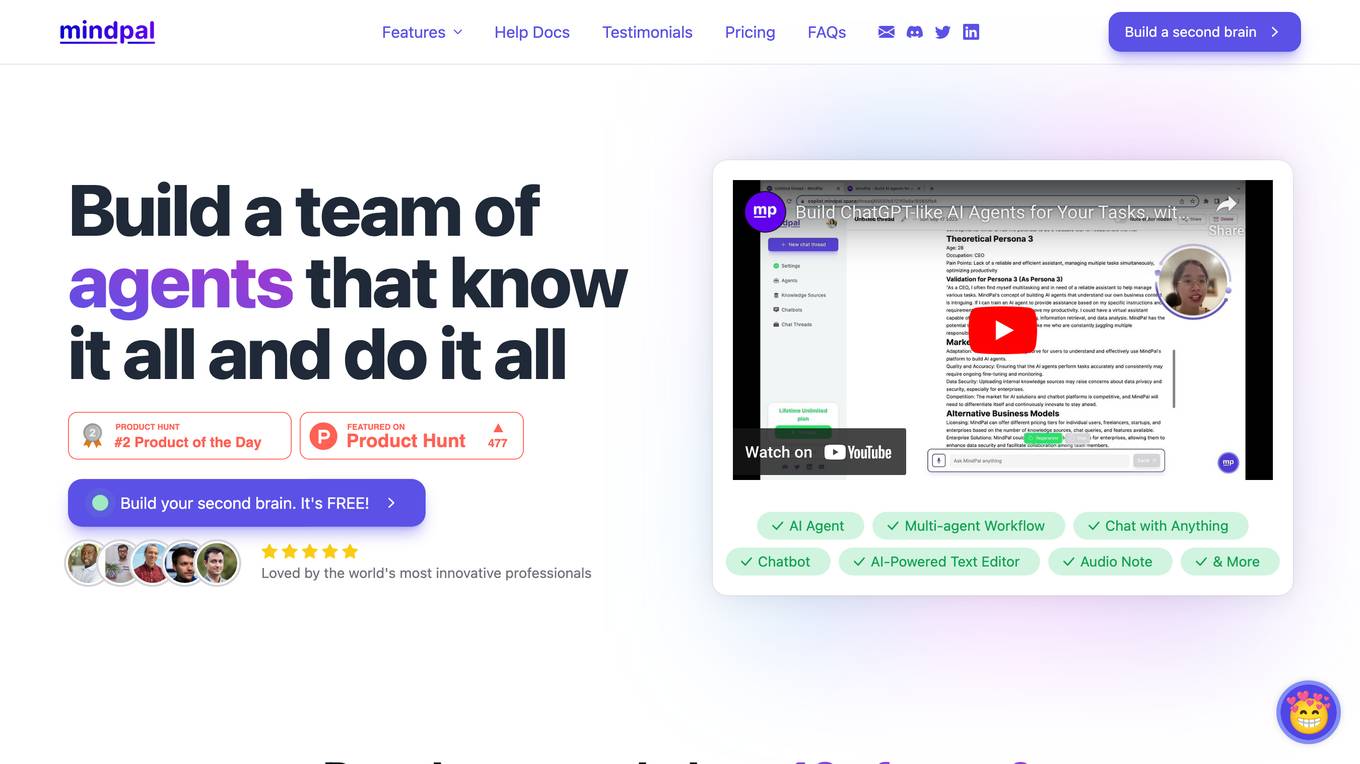
MindPal
MindPal is an AI application that offers a platform to build and run AI agents and multi-agent workflows for automating complex processes in businesses. It allows users to create specialized AI agents, connect multiple agents into workflows, and collaborate with humans seamlessly. MindPal integrates with various AI models, existing business tools, and enables users to start automating tasks in minutes. Users can train AI agents with their data, generate on-brand content, and handle multiple tasks simultaneously. The platform also provides AI workflow templates for various business functions.
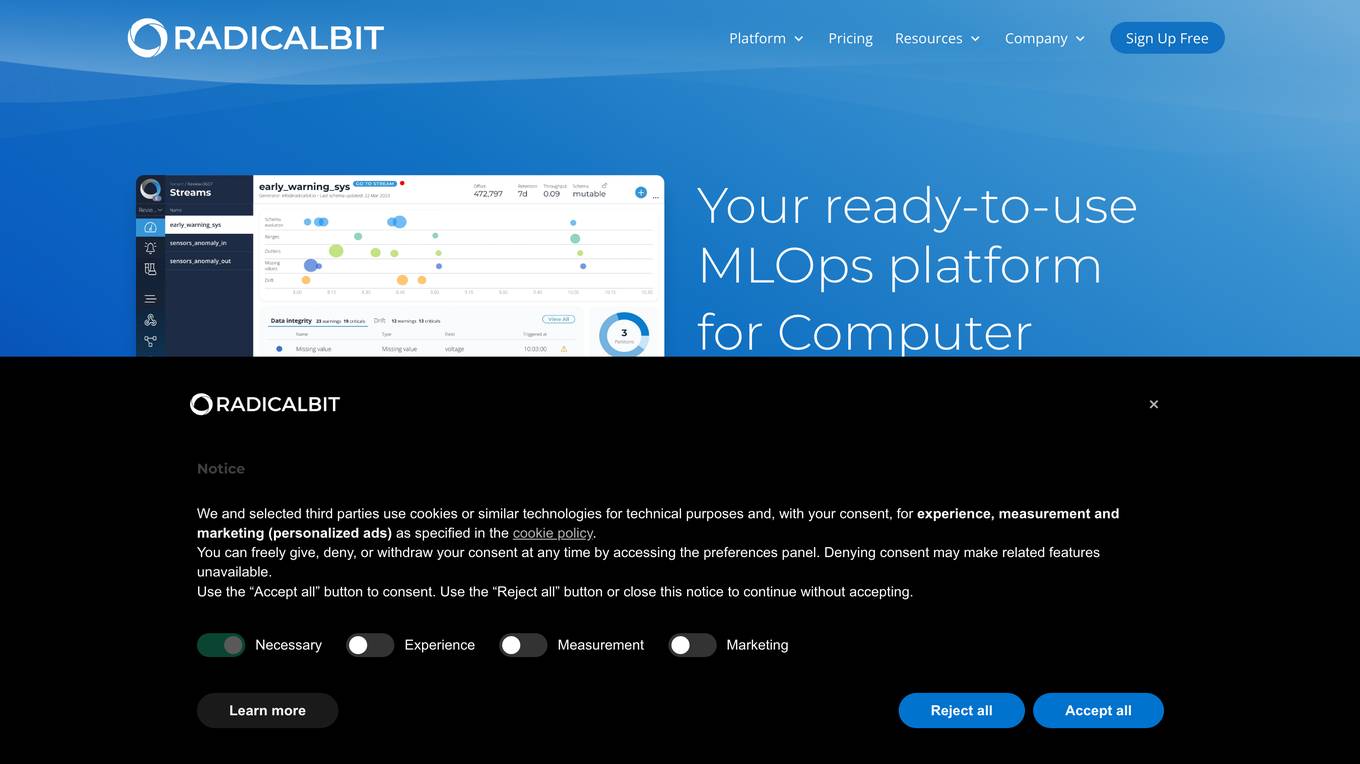
Radicalbit
Radicalbit is an MLOps and AI Observability platform that helps businesses deploy, serve, observe, and explain their AI models. It provides a range of features to help data teams maintain full control over the entire data lifecycle, including real-time data exploration, outlier and drift detection, and model monitoring in production. Radicalbit can be seamlessly integrated into any ML stack, whether SaaS or on-prem, and can be used to run AI applications in minutes.
0 - Open Source AI Tools
20 - OpenAI Gpts

Dungeon Master Assistant
Enhance D&D campaigns with Roll20 setup and custom token creation.
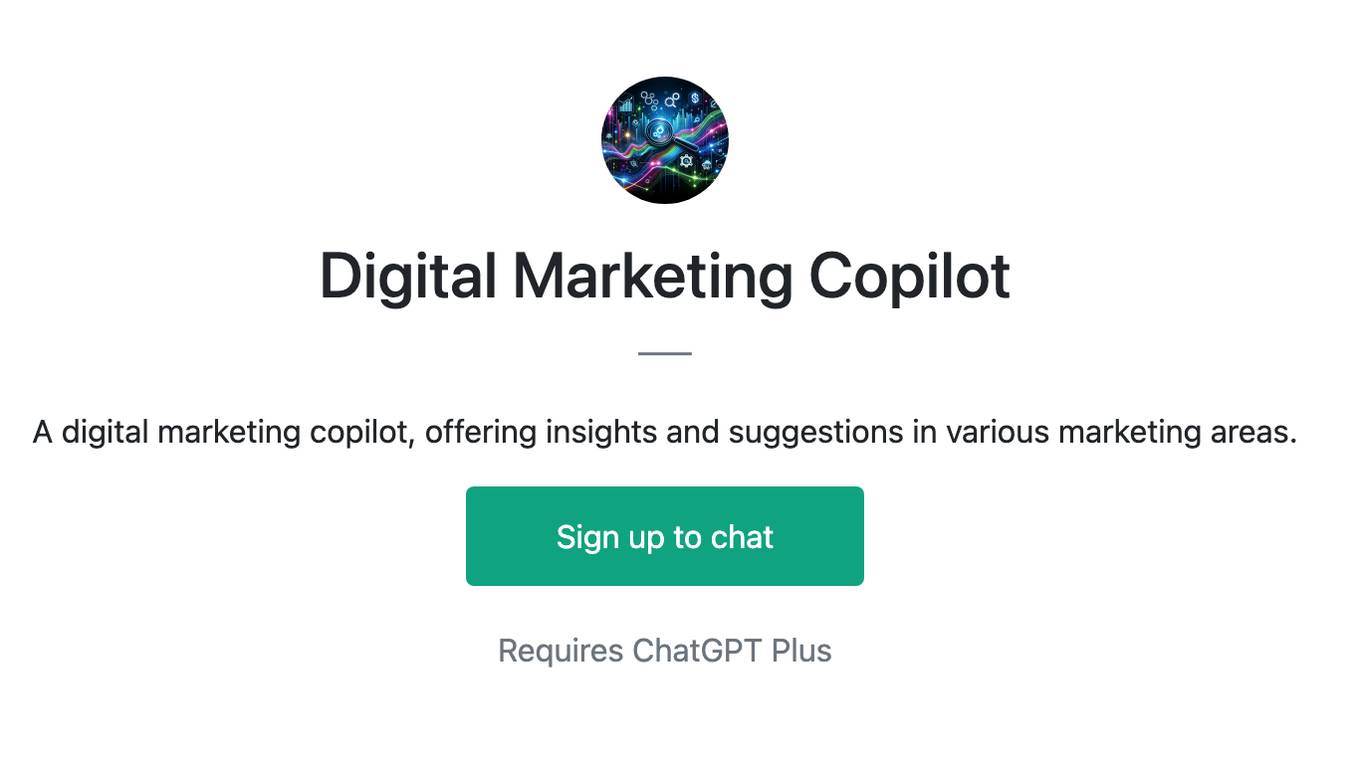
Digital Marketing Copilot
A digital marketing copilot, offering insights and suggestions in various marketing areas.

Kvaser - C&C Adventure Module Assistant
Adventure and encounter assistant for the game of Creatures & Chronicles

Consulting & Investment Banking Interview Prep GPT
Run mock interviews, review content and get tips to ace strategy consulting and investment banking interviews

Dungeon Master's Assistant
Your new DM's screen: helping Dungeon Masters to craft & run amazing D&D adventures.

